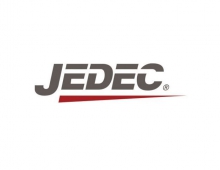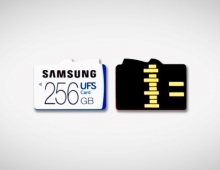
JEDEC Publishes Universal Flash Storage Standard v2.0
JEDEC Solid State Technology Association today released the Universal Flash Storage (UFS) version 2.0 standard, which offers increased link bandwidth for performance improvement, a security features extension as well as additional power saving features over the prior version.
UFS is a high performance interface designed for use in computing and mobile systems requiring low power consumption such as smart phones and tablets. Its high speed serial interface and optimized protocol enable improvements in throughput and system performance. In UFS v2.0, the link bandwidth has been increased from 300 MB/s in UFS v1.1 to up to 600 MB/s per lane, and multilane support has been introduced allowing up to 1.2 GB/s per each data transfer direction.
To achieve the highest performance and most power efficient data transport, JEDEC UFS aligns with specifications from the MIPI Alliance to form its Interconnect Layer. This collaboration continues with UFS v2.0, which references the M-PHY Version 3.0 specification and the UniProSM Version 1.6 specification.
JEDEC has also published two complementary standards, JESD223B UFS Host Controller Interface (UFSHCI) version 2.0, and JESD223-1 UFS Host Controller Interface (UFSHCI), Unified Memory Extension. JESD223B is intended to simplify the design process by defining a standard host controller interface on which system designers can create a common host controller software driver layer to work with UFS host controller hardware from different manufacturers. The HCI functionality also enables higher performance and power efficiency by minimizing the involvement of the host processor in the operation of the Flash storage subsystem. The JESD223-1 UFSHCI Unified Memory Extension standard defines the interface between the UFS driver and the UFS host controller. In addition to the register interface, it defines data structures inside the system memory, which are used to exchange data, control and status information. Unified Memory offers the possibility to move device internal working memory into the system memory to reduce overall system cost and to improve device performance.
To achieve the highest performance and most power efficient data transport, JEDEC UFS aligns with specifications from the MIPI Alliance to form its Interconnect Layer. This collaboration continues with UFS v2.0, which references the M-PHY Version 3.0 specification and the UniProSM Version 1.6 specification.
JEDEC has also published two complementary standards, JESD223B UFS Host Controller Interface (UFSHCI) version 2.0, and JESD223-1 UFS Host Controller Interface (UFSHCI), Unified Memory Extension. JESD223B is intended to simplify the design process by defining a standard host controller interface on which system designers can create a common host controller software driver layer to work with UFS host controller hardware from different manufacturers. The HCI functionality also enables higher performance and power efficiency by minimizing the involvement of the host processor in the operation of the Flash storage subsystem. The JESD223-1 UFSHCI Unified Memory Extension standard defines the interface between the UFS driver and the UFS host controller. In addition to the register interface, it defines data structures inside the system memory, which are used to exchange data, control and status information. Unified Memory offers the possibility to move device internal working memory into the system memory to reduce overall system cost and to improve device performance.





















